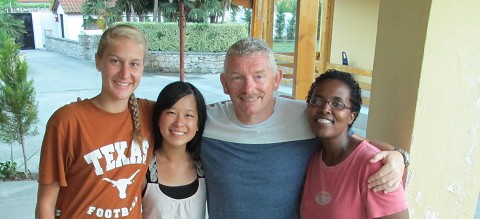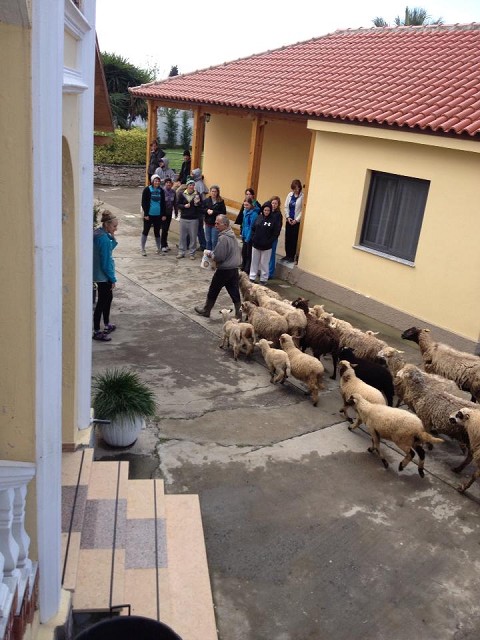I don’t know if I’ve ever actually seen The Karate Kid in its entirety, but I still know who Mr. Miyagi is. He’s famous for teaching a kid named Daniel how to karate chop someone by making the kid wax cars and put on a jacket. Though the karate kid was frustrated and confused by Mr. Miyagi’s cryptic style of teaching, he eventually realized that the sensei’s lessons were wise and applicable.
This month in Albania I met my very own Mr. Miyagi.

(George; photo from Freweini)
If you haven’t already heard, my whole squad has been doing manual labor on the property of an Albanian summer camp run by a British man named George. For a month now, we’ve been hauling rocks, painting fences, cleaning out pigpens, and other various tasks around the campus. The first week or so everyone was really enthusiastic and excited to get to work. As the second week of work began though, we started to notice a frustrating trend.
At the time I was on “rock duty”, so I spent six hours a day breaking and hauling rocks. It was hard work to begin with, but it became unnecessarily more difficult when we realized that George developed the habit of coming out to our work site and instructing us to move rocks from one pile to another so that they could then be loaded onto a trailer so that they could eventually be unloaded elsewhere. Essentially, George was telling us to haul heavy rocks from Point A to Point B to Point C when they could easily have been moved straight from Point A to Point C.

(shepherd duty; photo from Julia Taylor)
After I caught on to these seemingly ridiculous instructions, I started to get frustrated. It just doesn’t make sense to move them so many times. We’ve got to work smarter, not harder.
By the second week of hauling rocks, it became almost comical. We’d try to guess just how many ways George would have us shuffle the rocks around the property. Though we were getting worn out by moving them from pile to pile, we kept working hard. We also began to develop strategies for working efficiently and consequently, our communication also improved. We learned to pace ourselves in the heat of the day and take turns doing the heavy lifting. And all along the way, we had deep, intentional conversations with each other.
While I was hauling rocks, other teams were painting fences. They’d spend a whole day painting one fence, and the next day George would ask them to do it again. “I want at least three coats on each fence,” he’d say. Day after day of doing the same job got frustrating for them too. But they learned, as did we, that it’s important to do the job right the first time because when George comes around to inspect your work, you want it to be to his pleasing. It’s easy to skip priming and get straight to painting, but then the whole job has to be completely redone.

(One day we visited a ministry called Aid to the Balkans and helped them feed some cute kiddos)
After a couple weeks of doing this “World Race busy work”, I started to see what was really going on. George was pulling some Mr. Miyagi stuff on us. I finally realized that it wasn’t about moving the rocks or painting the fences. I mean, those things did actually need to be done, but George wasn’t just having them done to keep us busy. The rock-moving, fence-painting, and poop-shoveling were all strategically designed to teach us some really good lessons:
- Work hard with integrity. A good work ethic will take you exceptionally far in life.
- If you have a huge job in front of you, be organized and strategic about how you tackle it. Divide and delegate the work evenly.
- Pull your weight and encourage others to do the same.
- When you’re bored with the mundane task in front you or you’re just really tired, it’s easy to cut corners and do the job half-heartedly. But that will only result in a poorly finished product that will need re-doing. You wouldn’t do that if Jesus were your boss, right?
- Learn from your co-workers, whether you’re learning about painting techniques or Biblical theology.
- “Work brings profit but mere talk leads to poverty.” Proverbs 14:23
- Accept correction with patience and humility.
- Do not micro-manage others; instead empower them to accomplish the task before them.
The lessons I learned this month now line the shelves of my heart and will go with me into the world. What I learned while painting fences and hauling rocks has way more value and applicability than many things I could've read in a lengthy textbook about teamwork, ethics, or humanitarian work in the Third World.
In missions and in life, remember that sometimes it's not about the task right before your eyes but instead about the things it can teach you.








